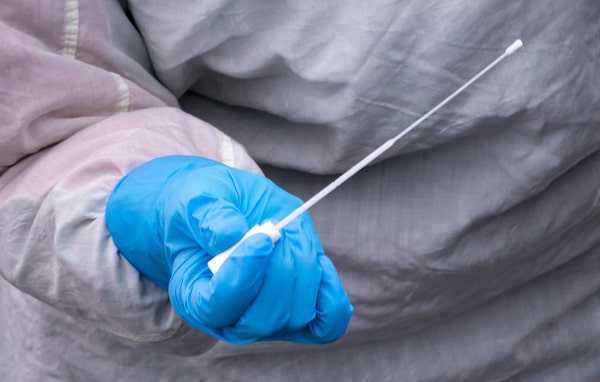'Our lives have changed unequivocally, regardless if this is a temporary surge,' Thornhill Medical CEO Lesley Gouldie, seen here with a ventilator at their Toronto facility on March 31, 2020, says.Christopher Katsarov/The Globe and Mail
Canadian medical device startups have struggled for years to sell to governments at home, making it hard to persuade foreign buyers to follow suit. The onset of the global COVID-19 crisis has changed that.
As Ottawa scrambles to secure vital medical supplies for the fight against the virus, it has turned to domestic companies big and small to help, rapidly signing orders to secure millions of masks, coronavirus test kits and other items made on Canadian soil. This week, the federal government said it had signed deals with medical device suppliers Spartan BioScience Inc. of Ottawa and Toronto’s Thornhill Research Inc. – contracts that could transform both companies from small operators into global players.
Spartan, whose portable DNA testing machines can determine within 30 minutes whether a patient is positive for coronavirus, will supply 100 of its devices, along with a million test-kit cartridges. Co-founder and chief executive Paul Lem says Ottawa plans to deploy the machines to remote and Indigenous communities, and to airport screeners and border crossing agents so they can determine on site if people have the virus, rather than sending samples away to central labs and waiting several days for results.
Canada is spending millions on faster testing tech for COVID-19. How could it impact the backlog?
While government procurement deals typically take months to complete, the $78-million contract closed just five days after Ottawa signed a letter of intent with Spartan. The company has made deals worth another $80-million with the Ontario and Alberta governments. (Both it and Thornhill have also seen a surge in interest from foreign buyers.)
“How does a company of 70 people get $150-million in purchase orders in one week from [the] government?” Mr. Lem says. “I never knew they could move so fast – but they can when there’s a public-health crisis and every day matters.”
Prepandemic, Spartan had some niche success selling testing solutions for doctors treating heart patients and building managers monitoring toxic bacteria in their water. Once Spartan gets Health Canada clearance for its tests, the company says it will take eight to 12 weeks for its local supplier of test cartridges to fully ramp up its manufacturing capacity, although it expects to begin shipments within weeks. Taiwanese manufacturing giant Wistron Corp. makes the DNA testing machines under contract.

A nurse holds a swab to test a patient at a drive-through clinic at Ste-Justine Children Hospital in Montreal, on Wednesday.Paul Chiasson/The Canadian Press
As for Thornhill, it makes portable intensive care units with ventilators that generate oxygen from the air, under the brand name Moves SLC. Ottawa has ordered 500 of the ICUs, and Ontario has asked for 40. Until the pandemic hit, the startup had 40 employees and had sold 200 of the rugged units to military customers in the United States, Singapore, Australia and Israel (the Canadian Armed Forces took a pass).
“Our lives have changed unequivocally, regardless if this is a temporary surge,” Thornhill CEO Lesley Gouldie says. “People now know about us all over the world. I think we’ll have a sustaining business model post–COVID-19."
To meet the surge in demand, Thornhill, which was spun out of Toronto’s University Health Network in 2004, reached a deal with Linamar Corp. to assemble 400 units a month at the auto-parts supplier’s plant in Guelph, Ont. (At Thornhill’s own facilities, its monthly capacity is 50).
“It’s a tragedy and crisis that we’re in, so I hate that it was the catalyst,” Linamar CEO Linda Hasenfratz says. “But it’s an opportunity for them to take their product to a global stage given there is a dire global need for these types of products.”
Observers in the innovation sector say the speed at which these deals have come together stands in stark contrast to normal times, when cash-starved startups either didn’t have the time to wait out long public-sector procurement cycles or found themselves frozen out as buyers turned to larger, more established suppliers. It’s an issue that has come up in industry and government reports for years – most recently in a 2018 economic-strategy report published by a government-appointed panel of health and bioscience experts.
“The crisis has clearly changed the speed in which we’re operating," Innovation, Science and Industry Minister Navdeep Bains says. “There’s a recognition that we need to be quick and nimble.”
But many are wondering whether Ottawa’s rapid-fire procurement is temporary or a sign of permanent changes. “The remarkable speed to adopt Canadian innovation during our current crisis makes me optimistic that a new culture will be adopted from the top,” says Brenda Irwin, a health technology venture capitalist based in Vancouver.
Armen Bakirtzian, the CEO of Kitchener, Ont.-based medical tech company Intellijoint Surgical Inc., co-authored that 2018 report. “It depends on the federal government’s opinion of the need for innovation in our health-care system, since the provinces struggle so much in acquiring it themselves,” he says. “This gives me optimism that the federal government can procure innovation on behalf of the provinces. But the question is, will they close that door when the crisis is over?"
Benjamin Bergen, executive director of the Council of Canadian Innovators, a lobby group for tech companies, hopes not. The government’s moves to tap into the homegrown market, he says, “offer a valuable lesson that should shape both future procurement policies and strategic investments going forward.”
Sign up for the Coronavirus Update newsletter to read the day’s essential coronavirus news, features and explainers written by Globe reporters.